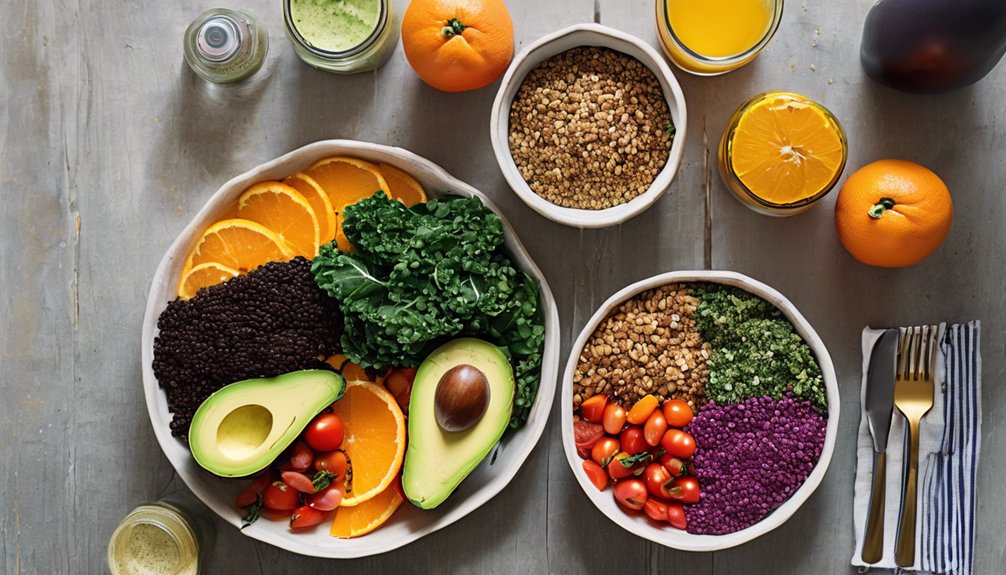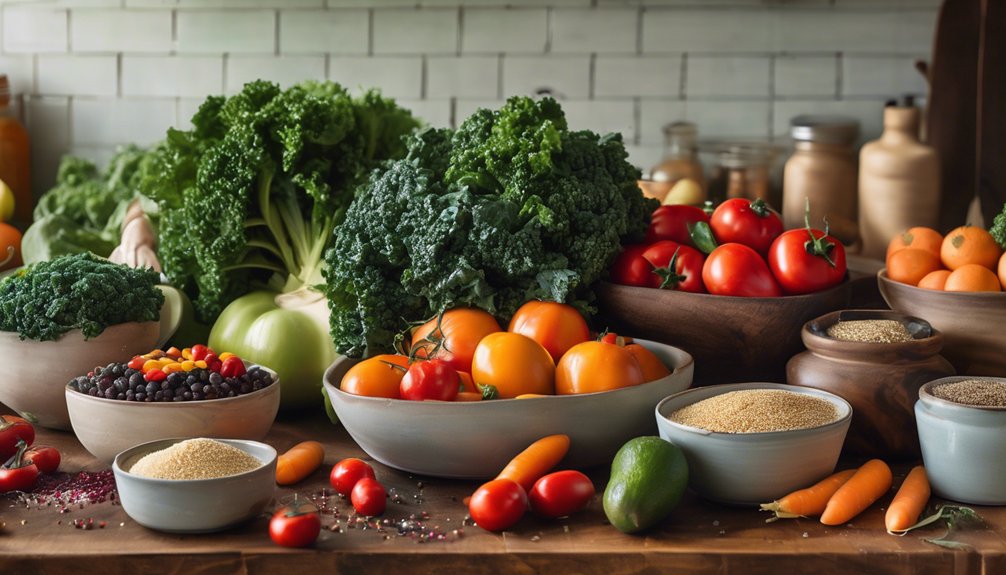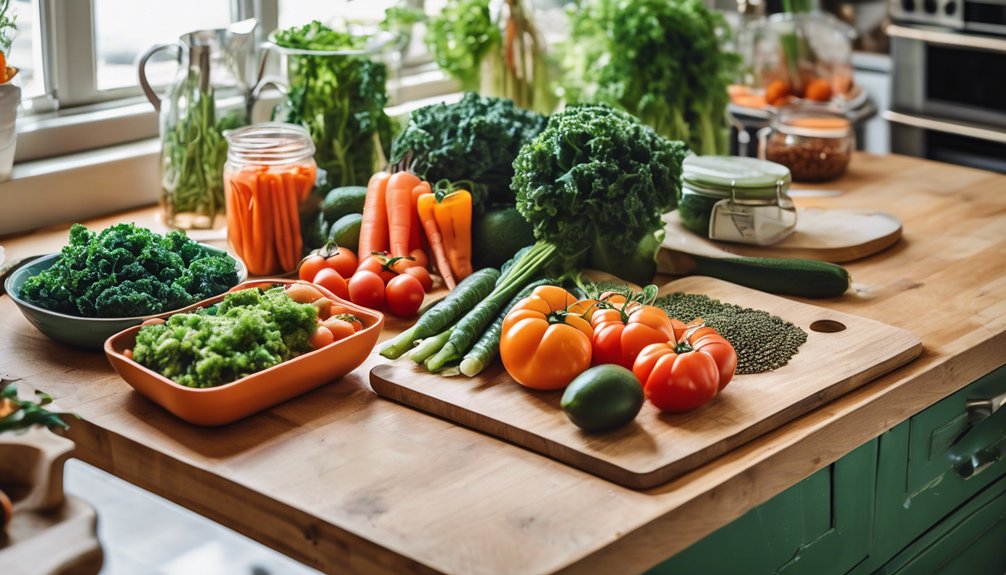Vegan Diet Tips for Beginners
Transitioning to a vegan diet can feel like stepping into uncharted waters, but with the right guidance, it can be a rewarding journey. You'll want to start by understanding the basics and stocking your pantry with essential ingredients. Planning your meals and exploring plant-based proteins can make a significant difference. As you navigate this new lifestyle, don't forget to consider how it impacts your social interactions. What strategies can you implement to make this transition smoother?
Key Takeaways
- Start by gradually eliminating animal products to ease the transition and avoid feeling overwhelmed.
- Stock your pantry with legumes, whole grains, nuts, and seeds for essential nutrients and protein.
- Plan meals in advance to ensure balanced nutrition and simplify grocery shopping.
- Experiment with various plant-based proteins like tofu, tempeh, and quinoa for diverse meal options.
- Connect with other vegans for support, recipe sharing, and tips for dining out or attending social events.
Understanding the Basics of a Vegan Diet
When you adopt a vegan diet, you choose to eliminate all animal products, which includes meat, dairy, eggs, and even honey. This decision brings significant nutritional benefits, as a well-planned vegan diet is rich in fruits, vegetables, whole grains, and legumes.
These foods provide essential vitamins, minerals, and antioxidants that can enhance your overall health. Additionally, you'll likely find you're consuming less saturated fat and cholesterol, which can contribute to better heart health.
Ethical considerations also play a crucial role in your choice. By going vegan, you're taking a stand against animal cruelty and environmental degradation, promoting sustainability.
Understanding these basics can empower you to make informed choices that align with your values and health goals, creating a fulfilling and compassionate lifestyle.
Stocking Your Vegan Pantry
A well-stocked pantry is key to successfully maintaining a vegan diet and making meal prep easier.
When you have the right essential staples on hand, you'll feel empowered to whip up delicious meals without stress.
Here are four must-haves for your vegan pantry organization:
- Legumes (like lentils and chickpeas) – packed with protein and fiber.
- Whole grains (such as quinoa and brown rice) – for energy and nutrients.
- Nuts and seeds – great sources of healthy fats and protein.
- Canned tomatoes – a versatile base for sauces and soups.
Meal Planning for Success
Meal planning is essential for maintaining a successful vegan diet, as it not only saves time but also helps you make healthier choices. Start by creating a grocery checklist to ensure you have all the ingredients you need for the week. Consider dedicating a few hours each week for meal prep; this will make your week smoother and more enjoyable.
Here's a simple table to help you organize your meals:
| Meal | Ingredients |
|---|---|
| Breakfast | Oats, almond milk, fruit |
| Lunch | Quinoa, chickpeas, veggies |
| Dinner | Tofu, stir-fry mix |
| Snacks | Nuts, hummus, veggies |
| Dessert | Chia pudding, berries |
With thoughtful meal planning, you'll set yourself up for success!
Exploring Plant-Based Proteins
Choosing the right sources of protein is key to a well-rounded vegan diet. Incorporating diverse plant-based proteins not only fuels your body but also keeps meals exciting.
Here are four great options:
- Tofu Varieties: Explore different types like silken or firm for various dishes.
- Legume Benefits: Beans and lentils pack a protein punch and are perfect for soups or salads.
- Quinoa Recipes: This complete protein grain can be a base for hearty bowls or pilafs.
- Nut Options: Almonds, walnuts, and peanuts add crunch and healthy fats to your snacks.
Don't forget to experiment with tempeh uses in stir-fries and enjoy protein smoothies packed with spinach and nut butter.
Embrace these choices to nourish your body and delight your taste buds!
Navigating Social Situations as a Vegan
Navigating social situations as a vegan can feel daunting, especially when dining out or attending gatherings where food is a central focus. To help you manage these moments, here are some practical tips to enhance your experience:
| Situation | Tips |
|---|---|
| Dining Out | Check menus online beforehand. |
| Attending Parties | Bring your own party snacks to share. |
| Invited to Dinner | Offer to contribute a vegan dish. |
| Social Gatherings | Network with fellow vegans for support. |
| Feeling Overwhelmed | Politely ask about ingredients. |
Understanding dining etiquette is key. Most people appreciate your honesty and effort. By being proactive, you can enjoy social events without compromising your values.
Frequently Asked Questions
Will I Get Enough Protein on a Vegan Diet?
Yes, you can get enough protein on a vegan diet. Incorporate plant-based sources like lentils, chickpeas, quinoa, and tofu. These protein-rich foods will help you meet your nutritional needs while enjoying delicious meals.
How Do I Handle Cravings for Non-Vegan Foods?
Did you know that nearly 70% of people struggle with cravings when changing diets? For craving management, try healthy substitutes like chickpea salad or almond butter. These can satisfy your cravings while keeping you on track.
Can I Be Vegan and Still Eat Junk Food?
Yes, you can enjoy vegan junk food, but be mindful of health implications. It's important to balance indulgence with nutritious options. Moderation is key to maintaining your well-being while satisfying those cravings.
What Are Common Nutrient Deficiencies in a Vegan Diet?
Are you missing out on essential nutrients? Common deficiencies in a vegan diet include B12 and iron. Explore nutrient sources like legumes and leafy greens, plus consider supplementation options to ensure you thrive on this journey.
How Do I Transition Gradually to a Vegan Diet?
To transition gradually, start by meal planning with delicious plant-based recipes. Swap one meal at a time for vegan options, focusing on whole foods. You'll enjoy exploring flavors while easing into this fulfilling lifestyle.
Conclusion
Embracing a vegan diet is like planting a garden of health and compassion. By gradually incorporating plant-based foods, stocking your pantry with wholesome staples, and planning your meals, you're laying a strong foundation for a vibrant lifestyle. Remember, every meal is an opportunity to nourish your body and the planet. With the support of fellow vegans and a bit of creativity, you'll navigate social situations with ease. So, take the leap—your journey to a more compassionate life begins today!












